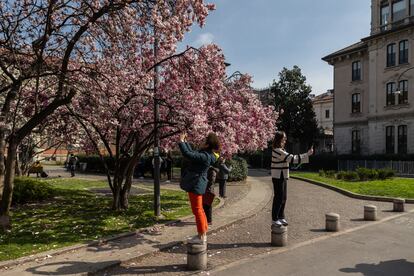Digital natives aren’t born, they’re made: towards a society of digital scholars
The skills and knowledge necessary to be able to utilize technology to solve problems, come up with solutions and create new services must be taught. We can’t assume that people will learn these skills as mere users

The 21st century is rife with opportunities, but also global challenges that threaten our survival. Our success as a species goes hand-in-hand with a population getting older all the time, the climate and energy crisis and an urgent loss of biodiversity on a planetary scale. When it comes to these matters, artificial intelligence’s potential to help us look for solutions is immense. But artificial intelligence designed for social good has yet to be invented — it is an essential task for future generations. But, how are we preparing today’s kids to contribute to tomorrow’s world?
The answer is, we really aren’t. One reason for this is because we confuse the use of technology with the development of the capacity to invent it. Digital natives do not exist. The skills and knowledge we need to be able to use technology as a tool to solve problems, come up with solutions and create new services must be taught. To be able to contribute to the society of the future, it is not enough to be a user of technology — although that’s surely a first step towards adapting to an increasingly automated world.
I therefore propose that we put our efforts towards fostering a culture of digital scholars. This concept would entail thinking about both technical knowledge of technology and the development of creativity, critical thinking and emotional and social tools to make decisions, collaborate and contribute to the society of the future.
From a technical knowledge perspective, being a digital scholar means knowing in detail how the technology that we use in our day-to-day functions, so that we can in turn create new tools that contribute to progress and help us to meet global challenges.
Many of the complex problems we face, like global warming, the energy crisis, our aging population and the disparity between rich and poor, will require solutions with a strong technological component, using technology that has yet to be invented. Being a digital scholar means mastering computational thinking and its five main concepts: algorithmic thinking, programming, data, networks, and hardware. Computational thinking is the equivalent of learning to read, write and do basic math in the 21st century. Let us not forget that no society is more easily manipulated than an ignorant society. How can we collectively decide what kind of technological development we want if we don’t know what we’re talking about?
Beyond technical skills, being a digital scholar involves embracing a balance between the digital world and the tangible reality that surrounds us. Being a digital scholar requires developing critical thinking, creativity, empathy, tolerance, perseverance, sustained focus on a complex task, patience, flexibility, the ability to manage boredom and to accept delayed gratification. These are skills that we know to have essential value not only for our well-being, but also for our ability to coexist peacefully and collaborate in a global community. These are skills that we can hardly develop and cultivate with exclusively technological experiences, which are designed to gratify us immediately, generating cycles of addiction with attention-span-decimating interruptions, that focus entirely on the present and in which the richness and multisensoriality of face-to-face human interaction is lost.
Being a digital scholar means knowing how to disconnect and maintain a physical presence and connection with the world around us, which are key to our mental health, our emotional well-being, our ability to collaborate with others, our creativity and ultimately, our happiness. To be a digital scholar is to recognize the importance of disconnecting in order to reconnect with our physical environment, the people we love and with ourselves. It is to understand that the true richness of life is found in the complexity of human relationships, in the exploration of nature, in artistic expression and in the search for the meaning of existence.
A society of digital scholars would be that which balances technological innovation with human wisdom, thus cultivating people and society that are capable of deftly navigating the digital world while maintaining a deep connection to their environment and own humanity. A society of digital scholars will be able to innovate responsibly, use technology to solve global challenges and promote human well-being in an interconnected world. Are we prepared to lead this digital revolution with integrity and wisdom? The time has come to work towards a world of digital scholars.
Nuria Oliver is a doctor of artificial intelligence at MIT, and co-founder and director of ellis.eu Alicante, a nonprofit organization to promote research of artificial intelligence in Europe.
Sign up for our weekly newsletter to get more English-language news coverage from EL PAÍS USA Edition
Tu suscripción se está usando en otro dispositivo
¿Quieres añadir otro usuario a tu suscripción?
Si continúas leyendo en este dispositivo, no se podrá leer en el otro.
FlechaTu suscripción se está usando en otro dispositivo y solo puedes acceder a EL PAÍS desde un dispositivo a la vez.
Si quieres compartir tu cuenta, cambia tu suscripción a la modalidad Premium, así podrás añadir otro usuario. Cada uno accederá con su propia cuenta de email, lo que os permitirá personalizar vuestra experiencia en EL PAÍS.
¿Tienes una suscripción de empresa? Accede aquí para contratar más cuentas.
En el caso de no saber quién está usando tu cuenta, te recomendamos cambiar tu contraseña aquí.
Si decides continuar compartiendo tu cuenta, este mensaje se mostrará en tu dispositivo y en el de la otra persona que está usando tu cuenta de forma indefinida, afectando a tu experiencia de lectura. Puedes consultar aquí los términos y condiciones de la suscripción digital.









































